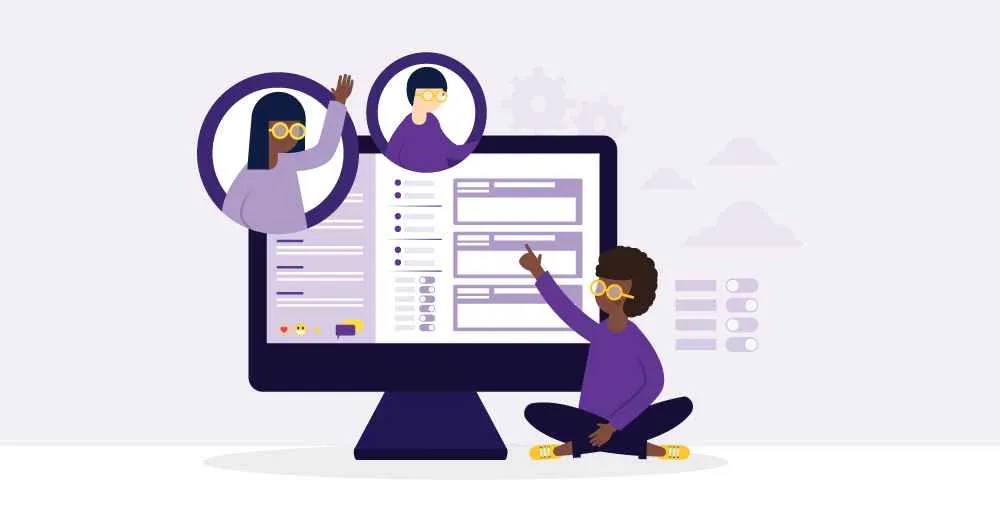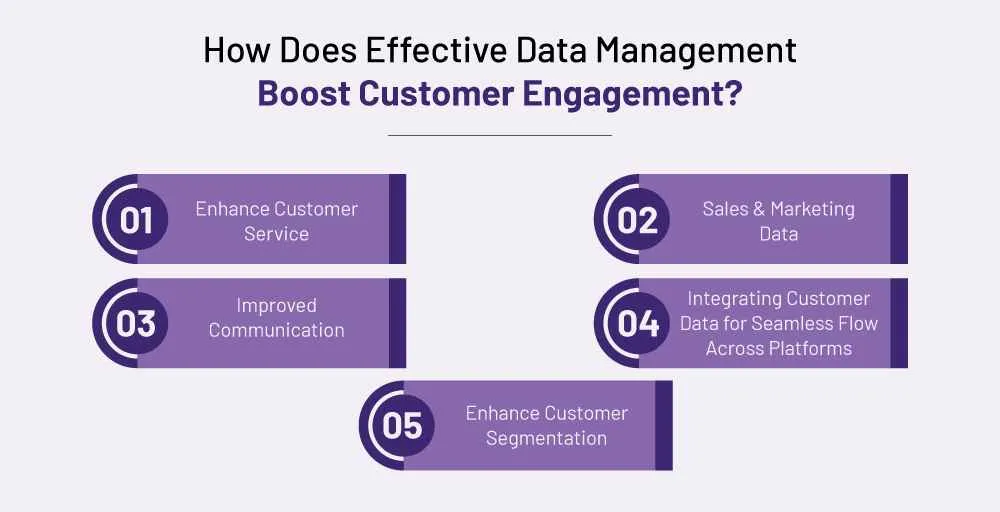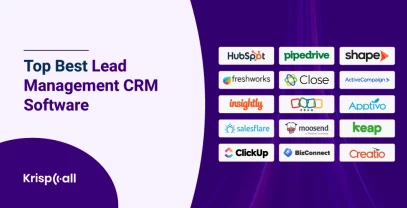Are you 👀 looking for data-driven strategies that improve customer experience, increase customer satisfaction, and enhance personalization?
Customer data management is the perfect choice if you want everything mentioned above.
Data management will help you understand customers in specific ways and use data effectively so that you can provide better leads for customer interactions.😊
In this blog, you will get detailed ideas about data management, strategies for smart data handling, and how effective data management boosts customer engagement.
🔑KEY HIGHLIGHTS
- Customer data management is a strategic method of handling customer data.
- Key components of customer data management are data collection, integration, management, analysis, customer division, personalization, targeting, and privacy.
- Effective data management boosts customer engagement and satisfaction by providing valuable insights and personalized experiences.
- Strategies like setting clear goals, centralizing data, investing in proper CRM, and ensuring data accuracy will help businesses boost customer engagement.
What Is Customer Data Management?
Customer data management is a process of collecting, organizing, protecting, and storing customer data to increase the business’s conversation and retention rate.
The main objective of customer data management is to utilize customer data to gain proper information about customers’ profiles that can be used by sales and marketing teams to improve customer interactions.

Customer data management involves gathering customer information from various sources, including customer experience marketing, customer support records, marketing platforms, and CRM systems, to view each customer comprehensively.
After getting a complete picture of customers, the business focuses on improving their interactions, marketing campaigns, and service, ultimately improving overall business operations.
Implementing robust data management practices enhances customer engagement and lays the foundation for delivering personalized experiences through data-driven customer service strategies.
Key Components Of Customer Data Management
Key components in data management are crucial and help businesses collect, organize, store, and share all customer data.
All these 🔑 key components collaborate and help businesses meet their objectives effectively. Moreover, they also ensure that the data is delivered to the right audience in the right place.
Some of the key components of customer data management are:
- Data Collection: The business gathers customer data from various sources such as purchase history, interactions, surveys, and social media.
- Integration Of Data: All customer information is integrated from multiple sources and consolidated into a unified customer profile database to ensure data accuracy and consistency.
- Data Quality Management: Managing and ensuring the data’s quality by regularly cleaning and validating customer data.
- Data Analysis: Analysing data allows businesses to check customer data closely and accurately. It helps businesses find patterns and insights and understand customer behavior and trends.
- Dividing Customers: Dividing customers based on behavior and purchase patterns helps businesses develop personalized marketing strategies and communications.
- Personalization And Targeting: Utilizing customer data to provide personalized communications and communication with individual customers.
- Data Security And Privacy: Protecting the customer’s data and information by ensuring compliance with data protection regulations and implementing legal regulations.
How Does Effective Data Management Boost Customer Engagement?
Effective data management helps businesses boost customer engagement by providing relevant data and personalized experiences. It also improves customer service and communication.
Here is some detailed information on how effective data management can help business boost their customer engagement.

1. Enhance Customer Service
Effective data management allows the business to examine full customer details, such as their experience, likes 👍, and issues. Evaluating all these details allows the business to provide faster, more efficient, and more personalized support.
Effective data management also gives customers quick answers to their questions, enhancing their good company experience. Moreover, knowledgeable and responsive support staff can analyze what customers really need and enhance satisfaction by providing proper guidance 📜.
This high level of service encourages customers to return to the business and strengthens the customer’s connection with the brand.
2. Sales And Marketing Data
Sales and marketing data helps businesses analyze customer preferences, trends, pricing 💰strategies, and how to drive marketing campaigns.
By collecting, storing, and analyzing data, businesses can more effectively and efficiently target their potential customers and understand their needs.
After determining customer needs, businesses use various email campaign techniques to optimize their sales with a personalized touch.
This strategy ensures that all the targeted customers are covered. Emailing is an effective method of directly accessing the right audience; however, most customer and sales data is saved in a CRM, which manages an efficient customer relationship.
3. Improved Communication
Effective data management helps businesses access the current contact details of their consumers and reach out to them at the right time. Contacting customers can be done through direct messages, email promotions, coupons, or timed notifications.
Customers appreciate receiving marketing messages that are more personalized and relevant to their interests and behavior. When customers feel appreciated, understood, and valued, they are likelier to develop strong brand loyalty. In conclusion, proper data management will improve communication between customers and businesses, automatically satisfying customers and increasing client retention.
4. Integrating Customer Data For Seamless Flow Across Platforms
Integrating customer data involves creating a link that automatically updates the data in the two systems in real-time by flowing between them. By integrating the data, you can create one unified view of all the data within the sales and marketing software.
This integrated approach provides a single customer picture 🖼️ for your marketing and sales processes. It observes what product the customer bought through sales and the marketing emails the customer opened and interacted with.
Having this unified customer data shared and integrated into your sales and marketing channels makes it simpler to better understand and fulfill each customer’s needs and wants. You can then make further targeted marketing and messaging based on your information about each prospect.
5. Enhance Customer Segmentation
Effective data management allows businesses to gather all the important details about the customer and segment it. Segmentation is important because customers are different, and their choices and preferences can also differ.
In this case, a business creates advanced segmentation by tagging, grouping, and segmenting customers. This ensures that the right messages reach the right people, increasing engagement and conversions. Similarly, businesses can create a personalized marketing message and product recommendations according to individual tastes. Because of the personalized message, the customer feels more valued and is likely to stay connected with the business.
What Are The Strategies For Effective Customer Data Handling To Enhance Customer Relationships?
Smart data handling to enhance customer relations involves regularly ensuring data accuracy, using data security measures, setting clear goals, utilizing data analytics, and segmenting customers based on their behavior preferences.
Moreover, ensuring seamless data integration across all platforms provides a consistent customer experience. These strategies collectively strengthen customer relationships and drive business success.
Some of the key strategies for effective customer data handling to boost customer relationships are:
1. Develop Clear And Defined Goals
As with any management strategy, developing clear and defined business goals in the beginning phase of the CDM process is important. Goals can include customer satisfaction, enhancing organizational performance, or increasing revenue.
Developing and defining a clear goal only requires a few approaches. First, you must examine the basic customer identity question with the proper data management approach. Similarly, you should learn how customer data can be used to improve experiences, develop new products, or even utilize marketing. Figuring out what customers really want helps businesses grow.
2. Centralizing Data
Customer data must be centralized to understand your customers better. Centralizing data combines all the customer’s data from various sources, such as online, purchase history, conversations, and social media. Centralizing data will make it easier to access and manage and give you a clear picture of the customer.
When you centralize all the data you have gathered in one place, you will better understand what customers like and need. You can use advanced CRM tools to combine and analyze all that data to make smart decisions about engaging with customers.
3. Invest In Customer Database Software
Investing in proper customer database software is a crucial tool in today’s age. Previously, business owners stored data in spreadsheets, which was unsafe and inefficient. But now, many businesses have started investing in customer database software, also known as CRM tools.
CRM tools help keep your customers’ data safe and follow rules to protect people’s privacy (like GDPR). With the right CRM tool, you can easily organize and collect important customer data and analyze customer information securely. This improves customer service, increases conversation and retention, and enhances the ability to tailor marketing strategies.
4. Ensure Data Accuracy And Quality
Ensuring data quality and accuracy is one of the key factors in efficient Customer Data Management. To keep customer data accurate, you must regularly conduct data quality audits. Also, integrate the data pre-processing technique to eliminate errors, redundant data, and old information so that your customer information is reliable, uniform, and comprehensive.
In addition, you should regularly update your customer database with up-to-date information on customers and any market changes. Ensuring all data accuracy will help you establish the credibility of your data, improve business decision-making, and improve customer relations and sales.
5. Leverage In Data Analytics
If you are thinking of maximizing customer data, investing in a powerful data analytics tool is the key. Data analytics tools will help your business identify important information supporting different businesses’ decision-making and planning activities.
Advanced analytics allows you to analyze customer behavior, trends 📈, and preferences easily. This assists organizations in customizing their products and promotional campaigns to fit their client’s needs and preferences. Further, predictive analytics models can help you better understand future trends and customer behavior to stay ahead of competitors.
Wrapping Up
Smart data management significantly enhances the customer experience by delivering valuable insights, enhancing personalizations, and improving customer conversation. Moreover, it improves customer relationships by implementing strategies like developing clear goals, centralizing data, and investing in customer database software. 🌟
Effective data management plays an important role in boosting customer engagement, and with a platform like KripCall, it can be easily achieved. KrispCall provides a unified communication platform where businesses can centralize all customer data and give agents a wider view of customer interactions and overall details.
Similarly, with KrispCall analytics and CRM integration, a business can tailor its telephony conversation based on customer preference. The CRM system also helps the business team quickly access customer profiles and reduce the time needed to resolve issues. 💫
FAQs
What are the key benefits of using smart data handling for customer engagement?
The key benefits of using smart data handling for customer engagement are that it provides a deeper understanding of customer behavior and increases customer satisfaction, retention, and engagement.
What challenges may businesses face in implementing effective data management for customer engagement?
Businesses may face challenges like large volumes of customer data, which can be overwhelming, time-consuming, and difficult to manage. Likewise, This will lead to poor data quality with insufficient, incorrect data.





